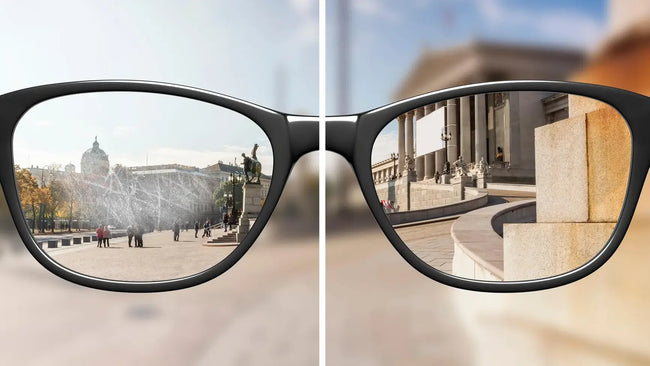By Dr. Mary Ann Aligweke (OD)
Scratch-resistant coatings protect your eyeglass lenses from everyday wear and tear, enhancing durability, clarity, and aesthetics. While not completely scratch-proof, these coatings extend lens life and save costs on replacements. For expert guidance and quality lens protection, visit SpecSMART Eye Clinic in Ikeja, Lagos.
What Is Scratch-Resistant Lens Coating?
Scratch-resistant or hard coatings are thin, protective layers applied to eyeglass lenses—commonly made from plastic, polycarbonate, or high-index materials—designed to reduce the likelihood of scratches and abrasions. Though not 100% scratch-proof, these coatings help lenses stay clearer and last longer.
How Does Scratch-Resistant Coating Work?
-
The coating bonds to the lens surface during a hardening process.
-
It creates a smoother, tougher surface that resists minor damage from dust, dirt, and cleaning.
-
This layer reduces the frequency and severity of scratches caused by everyday use.
Benefits of Scratch-Resistant Lens Coatings
1. Increased Durability
-
Protect lenses from scratches caused by keys, dust, and accidental drops.
-
Extend the lifespan of expensive prescription lenses.
2. Clearer Vision for Longer
-
Prevent scratches that cause distortion, glare, and visual discomfort.
-
Maintain sharp, clear vision during reading, driving, or computer work.
3. Cost Savings Over Time
-
Reduce the need for costly lens replacements due to damage.
-
Especially beneficial for users with strong prescriptions.
4. Improved Aesthetic Appeal
-
Keep lenses looking new by preventing visible marks and scratches.
-
Enhance the overall style and polished appearance of your eyewear.
5. Easier Maintenance
-
Less prone to scratches caused by cleaning with cloths or solutions.
-
Some coatings also offer anti-reflective or anti-smudge properties for added convenience.
Drawbacks of Scratch-Resistant Coatings
1. Not Fully Scratch-Proof
-
Cannot prevent deep or heavy scratches from severe impact or abrasive environments.
2. Wear Over Time
-
Coatings may degrade due to frequent cleaning or harsh chemicals, reducing effectiveness.
-
Proper care with microfiber cloths and mild cleaners is recommended.
3. Higher Upfront Cost
-
Adds to the price of your glasses, which may be a consideration for tight budgets.
Are Scratch-Resistant Lens Coatings Right for You?
-
Ideal for frequent eyeglass users who want to protect their investment and enjoy long-lasting clear vision.
-
Less crucial for occasional wearers or those on a strict budget.
-
Consult with the optometrists at SpecSMART Eye Clinic in Ikeja to assess your needs.
Final Thoughts
Scratch-resistant coatings offer crucial protection to your lenses, keeping them durable, clear, and visually appealing. If you wear glasses daily, this coating is a smart investment that enhances your eyewear’s longevity and visual performance. Schedule a visit to SpecSMART Eye Clinic in Ikeja, Lagos, for professional advice and quality eyewear options that suit your lifestyle.
(FAQs)
What is the difference between scratch-resistant and scratch-proof coatings?
Scratch-resistant coatings reduce the chance and impact of scratches but do not make lenses completely scratch-proof.
How can I maintain my scratch-resistant lenses?
Use gentle cleaning solutions and microfiber cloths. Avoid harsh chemicals and rough materials that can degrade coatings.
Does adding a scratch-resistant coating significantly increase lens cost?
There is an additional cost, but it is often offset by savings on fewer lens replacements over time.
Can scratch-resistant coatings be applied to all types of lenses?
Yes, including plastic, polycarbonate, and high-index lenses.
What additional benefits do some scratch-resistant coatings provide?
Some come with anti-reflective and anti-smudge coatings for easier cleaning and clearer vision.
📍Contact SpecSMART Eye Clinic Ikeja
Ile-Oja Mall, Opebi Ikeja
📞 0703 839 1197


